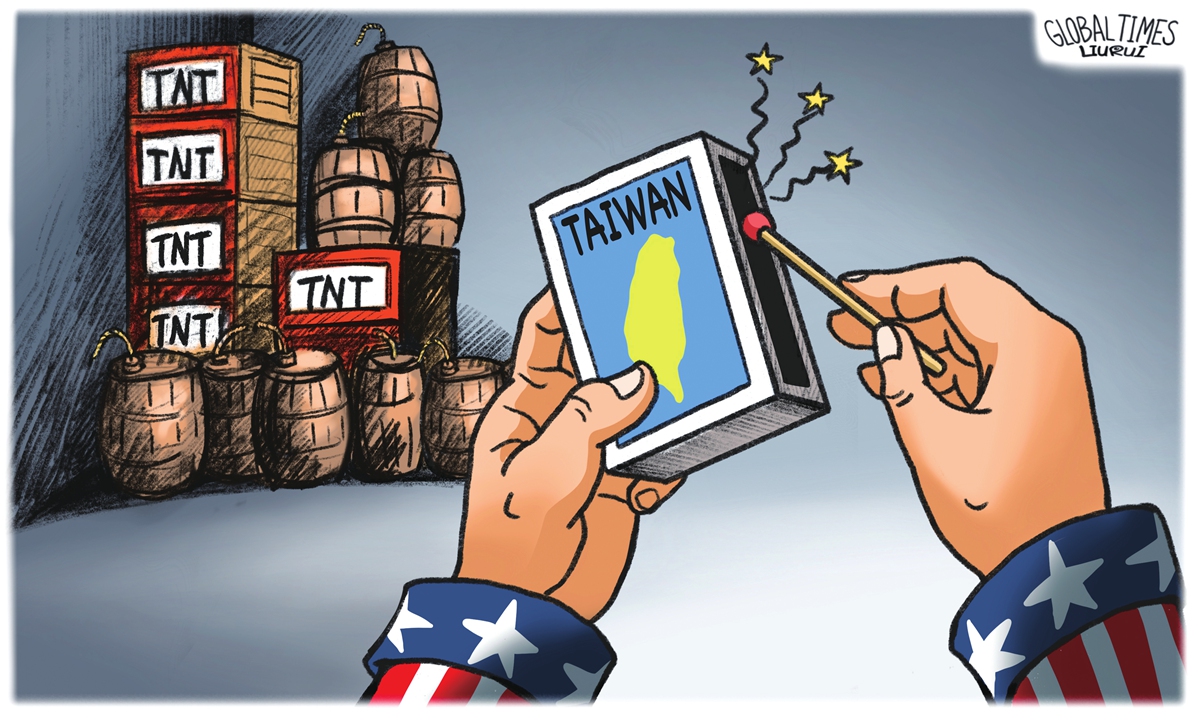
Illustration:Liu Rui/GT
The US Senate Committee on Foreign Relations has approved a bipartisan proposal that would require reports from US government agencies to prepare for and counter a Chinese mainland "invasion" of the island of Taiwan. Chinese experts said the bill shows a warlike mentality from some US hawks, who are trying to force the Chinese mainland to take strong countermeasures through provocations and thus seek more evidence to strengthen their "China threat" narrative. However, playing with fire on the Taiwan question will eventually harm US interests.
Dubbed the "Taiwan Protection and National Resilience Act of 2023," the bill was initially put forward by anti-China senators Marco Rubio and Gary Peters on March 30, 2023.
The bill, which still needs full Senate and House reviews and the president's signature before coming into law, requires several US government agencies including the US Department of State, Department of Defense and the Department of Commerce, to propose "non-kinetic options," including sanction strategies against the Chinese mainland, according to media reports.
It also asks leaders of the relevant agencies to provide reports to Congress on the sources of leverage that Washington would have against Beijing and to reduce its trade reliance on the Chinese mainland.
The Chinese mainland has always been the side trying to promote peaceful exchanges between the two sides of the Taiwan Straits, and it is the US and Taiwan secessionists who are escalating tensions, Zhang Wensheng, deputy dean of the Taiwan Research Institute at Xiamen University, told the Global Times on Friday.
The bill shows that some anti-China hawks in the US are looking to push for a military conflict across the Taiwan Straits and are preparing to push Taiwan people into its chariot, gradually turning their fantasy of a "Taiwan Straits war" into reality, so as to contain China with the people of Taiwan as victims, Zhang noted.
It also cannot be ruled out that behind the bill is lobbying from Taiwan secessionist authorities through various means behind the scenes, Zhang added.
Chaired by Congressman Michael McCaul, an anti-China hawk who visited Taiwan island in April, the US House Foreign Affairs Committee passed a bill dubbed the "Taiwan International Solidarity Act" on May 16, which aims to "protect Taiwan's participation in international organizations."
On May 24, a House committee adopted a set of policy recommendations, with most of the ideas presented concerning military readiness in the event the Chinese mainland takes "aggressive action" in the Taiwan Straits, according to the NBC News.
At the end of May, the Taiwan authorities received more than 250 Stinger missiles originally approved by the US in 2019.
Anti-China hawks in the US are trying to force the Chinese mainland to take strong countermeasures through their risky legislative actions, thus fleshing out their "China threat" narrative, Wen Shaobiao, an expert from the Shanghai International Studies University, told the Global Times on Friday.
The increasing frequency of Taiwan-related legislative measures in the US shows that the Congress is actively seeking to take the lead in the formulation of the country's Taiwan policy, aiming to influence the direction of China-US relations and hinder the White House's China policy, Wen said.
Playing with fire on the Taiwan question erodes the foundation of China-US relations and will eventually come back to harm US interests, Wen said.




